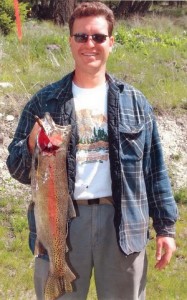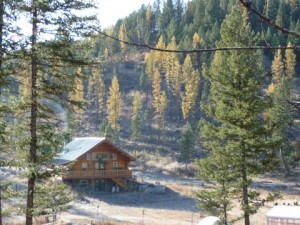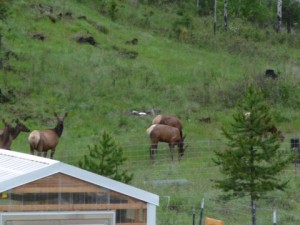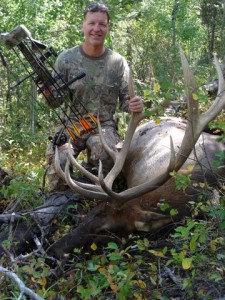Rich Scheben is living every prepper’s fantasy. Nestled in the mountains of northwestern Montana on 150 acres, Rich’s beautiful log home overlooks a panorama of wildlife and forestry. The waters running through this land teem with fish; deer and bear roam throughout; and the surcease of civilization brings with it a tranquility only imagined by those of us still dashing madly in the connected world we live in. But Rich’s journey to this place has been neither easy nor without its trials and tribulations.
 I have spoken with Rich Scheben several times. He is an articulate man, definitive in his beliefs, and extremely thankful and humble to be where he is today. He has faced obstacles and roadblocks nearly all the way, but his can-do spirit is a testimony to the tenacity that is a natural part of his personality.
I have spoken with Rich Scheben several times. He is an articulate man, definitive in his beliefs, and extremely thankful and humble to be where he is today. He has faced obstacles and roadblocks nearly all the way, but his can-do spirit is a testimony to the tenacity that is a natural part of his personality.
Rich was born in Jamaica, Queens, New York, and lived in the metropolitan areas of New York through his 26th birthday. Through the Boy Scouts, he discovered a love for camping, fishing, and canoeing. By high school his love for the outdoors had grown to include hunting and trapping.
Make no mistake—Rich Scheben loved the city, the fast-paced style of his environment, and the frenetic night life of urban living. A consummate dancer, he was a frequent patron of New York’s night clubs. In 1972 however, a movie debuted that changed not just his life in general, but the direction and focus of all his efforts toward achieving his goals and dreams of living “off grid.”
If you’ve never watched Jeremiah Johnson, you’ve missed a wonderful movie. It’s the story of a jaded American veteran of the Mexican War who retreats to the Rocky Mountains in an attempt to escape civilization. Jeremiah Johnson is exposed to elements and a way of life entirely foreign to him, and his ability to overcome and persevere is the plot for the movie. The movie is an entirely fictionalized account based on the true life story of “Liver-Eating” Johnson, a mountain man who lived in the 19th century American West. Johnson was originally from New Jersey, an adventurer, and loved the outdoors.
This movie was an inspiration for Rich Scheben, who already had an ongoing love affair with nature. He decided that, through hell or high water, he was going to move to the Northern Rockies and live the off-grid life of his dreams.
 To this end, Rich worked hard trying to save up the money to realize his goals and ambitions. He decided to pursue a degree in forestry so that he could get a job with the National Forestry Service and move his way toward Montana. However, life is seldom fair and never easy. Political correctness and preferences in hiring were making it difficult for him to procure a job with the Forestry Service. In fact, he was told point blank by the interviewer that as a white male, his chances of landing the job were slim to none. Two women with only high school degrees were hired in his stead.
To this end, Rich worked hard trying to save up the money to realize his goals and ambitions. He decided to pursue a degree in forestry so that he could get a job with the National Forestry Service and move his way toward Montana. However, life is seldom fair and never easy. Political correctness and preferences in hiring were making it difficult for him to procure a job with the Forestry Service. In fact, he was told point blank by the interviewer that as a white male, his chances of landing the job were slim to none. Two women with only high school degrees were hired in his stead.
Knowing that he would have to work harder, smarter, and be more aggressive to attain his goals, Rich took the advice of his father and put on a suit and tie, and began knocking on corporate doors. In 1982 he became the first sales trainee of an emerging pharmaceutical company. Throughout the following years, he moved to other companies and took on outside sales territories, traveling as he worked and saved his money. Refusing to spend all his hard-earned cash on rent, he bought a used trailer and parked it in a trailer park. He scrimped on amenities and watched his savings grow.
But he didn’t forget the people who had loved and supported him throughout his life. He used part of what he was earning to send his parents to Paris and London, on a Caribbean cruise, and to dozens of Broadway plays. For four years he lived in less-than-ideal conditions, often with no heat, and by the age of 26, he dropped the keys to the company car on his boss’s desk, loaded his meager possessions in a two-wheel drive pick-up truck, and headed west to Montana.
He had now achieved half his dream. The other half was finding the land that would allow him to go off grid for good. Finding new employment with another pharmaceutical company and once again saving his pennies, he began scouting the area, looking for the perfect place. However, the long hours and years traveling in a car had finally begun taking its toll on him.
 He had severe impingements in his lumbar spine, and MRIs showed severe spinal stenosis with herniated and ruptured discs in his cervical spine and nerve damage to his arms. An orthopedic physician and an occupational health physician both told the company he worked for that his driving hours had to be reduced by at least half. Rich asked his company to allow him to work as a job-share/part-time employee.
He had severe impingements in his lumbar spine, and MRIs showed severe spinal stenosis with herniated and ruptured discs in his cervical spine and nerve damage to his arms. An orthopedic physician and an occupational health physician both told the company he worked for that his driving hours had to be reduced by at least half. Rich asked his company to allow him to work as a job-share/part-time employee.
They said no. Human resources told him those positions were reserved for women only and that he should just go on disability. Because he wanted to continue working, Rich took the advice of his lawyer and refused, and found another pharmaceutical company that would hire him as their first male job-share employee. However, three years into his employment, the company wanted him to go full-time and give up his job-share status. Another round of legal and medical maneuverings with a corporation ensued, but this time the company won.
Rich was sent home. His attorneys told him that, had he been a member of some protected group, he could have remained on the job in his original job-share/part-time position. However, because he was a white male, reverse discrimination was perfectly acceptable in his situation. It was at this point that Rich decided he was through with the politically correct claptrap he and others like him were being subjected to. He felt a person should be judged by hard work, effort, proven results, and qualifications.
In addition to coping with the chronic, severe pain he was experiencing and the mental stress of losing his job, he was also going through a divorce and coming to grips with the bone cancer that was killing his father. It was at this crossroads in his life that he had to decide whether he was just going to lie down and give up his dream, or stand up and fight.
 And Rich Scheben decided to come out fighting. He lives on his 150 acres in northwest Montana, and despite his health and chronic pain, he is living his dream. Moderation and modifications to his lifestyle enable him to pursue his love of fishing, hunting, and gardening. He is joined in his love of the outdoors by Karen, his girlfriend and companion of ten years.
And Rich Scheben decided to come out fighting. He lives on his 150 acres in northwest Montana, and despite his health and chronic pain, he is living his dream. Moderation and modifications to his lifestyle enable him to pursue his love of fishing, hunting, and gardening. He is joined in his love of the outdoors by Karen, his girlfriend and companion of ten years.
Their lifestyle is amazingly simplistic yet obviously very satisfying. With the short growing season, a greenhouse and high tunnel provide them with vegetables. Game is plentiful, fishing is abundant, and goats are kept in a pen. They cook on a wood stove and have eschewed any connection to the electrical grid. Their home is a beautiful 1800 square foot hunting lodge with lots of open space. Their one concession to modern day living? They use the laundromat while in town to wash their clothes.
He wants everyone to know that each person will have challenges to overcome. It’s the willingness not to give up, he says, that separates the dream achievers from the quitters.
“Most people will fail a hundred times before they succeed once,” he told me. “The most important thing to remember is that our lives are about the journey, not necessarily the destination.”
Managing to attain that off-grid lifestyle is more than a matter of luck, ability, or having wealth. It’s about making the conscious decision to simplify life, about making the hard choices of needs over wants, and being willing to sacrifice, scrimp, and save to realize those goals and dreams.
Rich Scheben is no more talented, no more intelligent, and no more driven than any other person. He is, as he describes himself, an “average Joe.” He has however, found his calling. Not just in living the off-grid lifestyle, but in encouraging others to live out their dreams as well. He also spends his time speaking out against the insane political correctness that has engulfed our country. His advice?
 Think outside the box.
Think outside the box.
Go for your dream.
Make whatever sacrifices are necessary, but don’t forget where you came from or the people who have supported you along the way.
Life is about relationships—relationships with family and neighbors, nature, and nature’s God. In this world of economic and political turmoil, these relationships are the only things of true value. Through an off-grid lifestyle, we bring the simplicity to our lives that allow us to cultivate and maintain those relationships.
Off-grid living is more than a lifestyle… it’s a life choice.
You have it within you, if you so choose, to make that choice today.
 Off The Grid News Better Ideas For Off The Grid Living
Off The Grid News Better Ideas For Off The Grid Living



